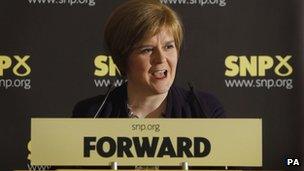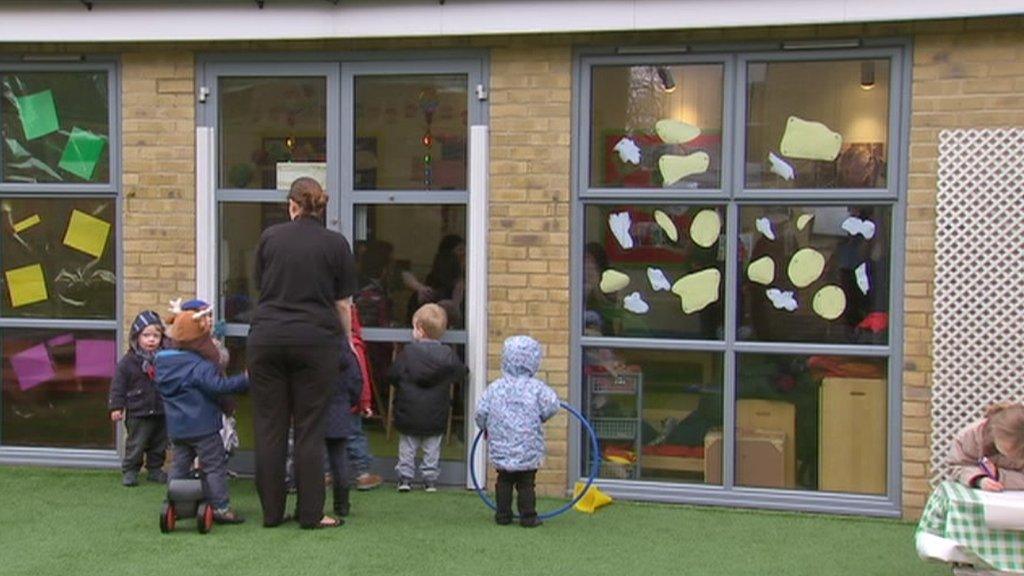Work to do on both sides
- Published

Mr Brown invoked the spirit of Labour politicians of the past
Today's intervention by Gordon Brown was about distinct politics: establishing a distinct offering within the broad pro-Union camp. And offering a distinct take on what he argued were distinct values.
On that latter point, there is a shorthand version occasionally deployed by those, particularly from a left of centre perspective, who advocate the Union.
That is to the effect that the demands for social justice are just as valid in……at this point there will usually be an alliterative list, a technique familiar to those who recall Tam Dalyell's speeches on what became known as the West Lothian question.
Remember? Blackburn, Lancashire - not Blackburn, West Lothian etc. And indeed etc, etc. In this contemporary version, the speaker will commonly say that social justice is warranted in Bristol as much as in Broxburn, in Liverpool as much as in Linlithgow.
As an argument against independence, that particular version has always struck me as somewhat limited and limiting. To extend the alliteration, one might as well say…..in Dundee as well as in Dublin, Dusseldorf and Dubrovnik.
In short, taken as it stands, it is an argument for world government, for values that straddle not just borders but continents.
Social justice
To be very clear, Gordon Brown did not deploy such an argument. He argued rather that there were values of social justice which had historic Scottish resonance, referring to such Labour politicians as Maxton and Hardie.
He argued further that such values - as past Labour leaders had acknowledged - were best delivered, on a pragmatic basis, across the wider economy and polity of the UK, with the greater canvas providing greater scope for redistribution.
And he argued still further that the Tories - and even their UK coalition colleagues, the Liberal Democrats - were resistant, intrinsically or in practice, to such values.
In short, he was suggesting that the Nationalists could not deliver social justice via the limited scale of the Scottish economy - and that the Tories would not. (In echoing that, Johann Lamont said she would back independence if it delivered social justice. But it did not - and so she would not.)
This was the particular reason Mr Brown gave for launching a Labour campaign to counter independence, rather than adhering purely and solely to the cross-party group, Better Together.
There are others. For one thing, Labour does not want a message which works solely for the referendum - but leaves nothing for the subsequent UK and Scottish general elections.

Ms Sturgeon is attempting to win more women over to the pro-independence camp
As one put it to me privately, a resolutely negative campaign could win the referendum but leave Labour looking slightly lame for the subsequent contests. So Labour wants to establish a distinct voice now, in preparation for battles to come when the main rivals will include their current buddies in Better Together.
There is another reason. There are, frankly, some inside Labour, including in the trades unions, who find it extremely uncomfortable to be working directly alongside the Tories - whom they regard as not just rivals, but enemies.
For them, today's launch - which was presaged by Johann Lamont when she agreed to cross-party co-operation - offers a conduit to campaign for the United Kingdom without endorsing the present UK political leadership.
Labour says this provides another leg, another underpinning to the case for the Union. By contrast, their Nationalist rivals suggest it is more likely to ca' the feet from the entire structure.
Nicola Sturgeon lampooned the creation of an independent Labour campaign - which was designed to counter independence.
The deputy first minister was also in Glasgow, spelling out potential new welfare policies for an independent Scotland. She said a post-independence government could reform welfare in order to assist women who are in receipt of benefits or moving into work.
The reason? She cited elemental fairness. But, as with Labour, there is a tactical calculation at play. Polls suggest that women are more sceptical than men towards independence.
Ms Sturgeon said there was a "natural majority" for independence in Scotland - if people could be convinced of the proclaimed economic gains. She acknowledged that the Yes camp had "work to do". But then they all do: both sides, all parties.
- Published9 May 2013

- Published7 May 2013
